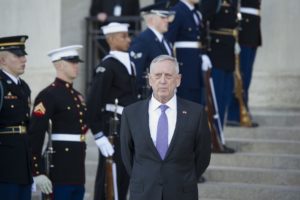by WorldTribune Staff, March 27, 2017
U.S. Defense Secretary Jim Mattis favors lifting prohibitions put in place by former President Barack Obama on military support for Saudi-led coalition operations in Yemen against the Iran-backed Houthi rebels.
Mattis, in a memo earlier this month to National Security Adviser H.R. McMaster, said that “limited support” for Yemen operations being conducted by Saudi Arabia and the United Arab Emirates would help combat a “common threat,” The Washington Post reported on March 26.

Some former officials believe increased U.S. military action is long overdue.
“One of our bedrock interests in the Middle East is freedom of navigation in and around the Arabian Peninsula, and while I understand why no one wanted to get further enmeshed in the Houthi conflict, we came dangerously close to dropping the ball on protecting our interests toward the end of the administration,” said Andrew Exum, who was a senior Pentagon official under Obama. “We were too hesitant to respond forcefully.”
The more immediate question raised by the Mattis memo is whether to provide support for a proposed UAE-led operation to push the Houthis from the port of Hodeida, through which humanitarian aid and rebel supplies pass.
A similar Emirati proposal for help in attacking Hodeida was rejected late last year by the Obama administration.
Gulf nations see Hodeida as a key asset for the Houthis and a lifeline to their backers in Iran, the Post report said.
Under Obama, U.S. military activity in Yemen was mainly limited to counterterrorism operations against Al Qaida’s affiliate there. Obama provided limited support for the Saudi and Emirati operations, selling them weapons and refueling their aircraft.
The Trump administration is undertaking a review of overall Yemen policy that is expected to be completed next month.
The Post cited several officials who said that Mattis and his advisers have asked for removal of Obama’s prohibitions, “which would enable the military to support Emirati operations against the Houthis with surveillance and intelligence, refueling, and operational planning assistance without asking for case-by-case White House approval.”
President Donald Trump’s administration “has echoed Saudi and Emirati charges that Iran is training, arming and directing the Shiite Houthis in a proxy war to increase its regional clout against the Gulf’s Sunni monarchies,” the report said.
Obama’s reluctance to offer stronger backing for the Saudi-led campaign in Yemen was part of Trump’s campaign indictment of Obama as “weak” on dealing with Iran.
The State Department this month approved a resumption of sales of precision-guided munitions to Saudi Arabia while restrictions on some intelligence-sharing have already been lifted, allowing the United States to reveal more detailed information on the location of Houthi missile sites.
Saudi Maj. Gen. Ahmed Asiri, a spokesman for the Gulf coalition, said in a phone interview that “at least now we understand that the government of the United States sees the reality on the ground . . . and that there is a country in the area that wants to use militias and spoil the situation.”
“Now the U.S., Saudis and the UAE are back on the same page,” said Yousef al-Otaiba, the UAE ambassador to Washington. “We’re getting the support we need.”
